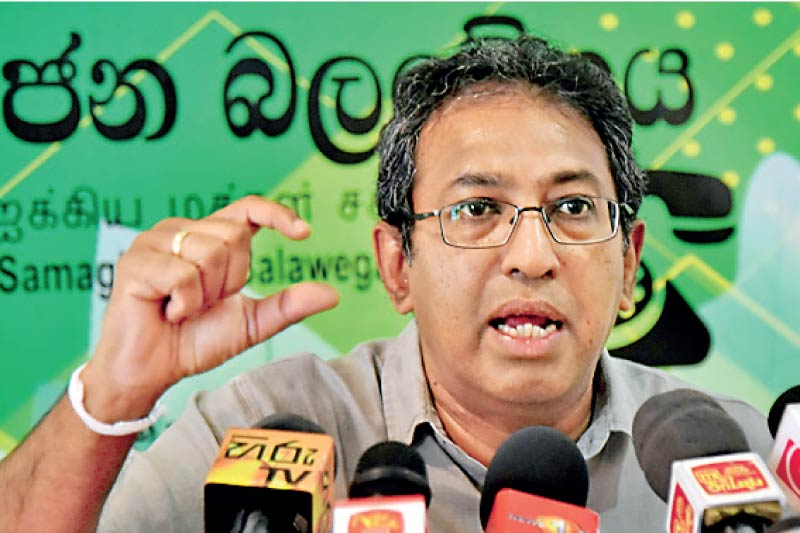Wednesday Feb 25, 2026
Wednesday Feb 25, 2026
Monday, 15 May 2023 05:49 - - {{hitsCtrl.values.hits}}

Main Opposition SJB MP Dr. Harsha De Silva gestures during the media briefing yesterday – Pic by Lasantha Kumara
By Darshana Abayasingha
Main Opposition SJB MP Dr. Harsha De Silva yesterday insisted that the Government must stand firm and fair during its negotiations with the IMF and creditors, and offer similar conditions to locals just as the international community.
He added if Sri Lankans must bear the brunt and make sacrifices during this period, they must also be entitled for reflective benefits once the economy turns positive.
Addressing journalists yesterday, Dr. De Silva urged the Government to be pragmatic with its measures on domestic debt restructuring – or optimisation – and remarked the process must be concluded in a balanced manner. He recommends the Government considers a financial sector support fund to ensure the safety and stability of the financial sector. This would require a sum of around $ 1 billion and could be obtained from The World Bank or the Asian Development Bank, De Silva said.
“The restructuring must be done according to the principles of the Laffer curve, which basically means if you push something beyond an optimum level or affordability, it cannot produce the desired results. The Government first said it will not go for a domestic debt haircut, but now we know they have to do it. If this process is not managed and the cut is too high there can be increased capital shortfall in shareholder equity. Banks could be impacted significantly and the net debt relief we receive will diminish and this will become a burden rather than a benefit,” De Silva warned.
The SJB MP said banks hold significant assets in the form of Treasury Bills and any reduction to their value does not reflect on liabilities. This could lead to significant capital adequacy issues, whereby the financial sector support becomes crucial. De Silva welcomed statements from the Central Bank Governor and State Finance Minister who both said they will not allow any impact to the stability of financial markets.
“The domestic debt restructuring program must be discussed in great depth at the highest levels. All potential risks must be identified. We do not have a proper platform to discuss this in parliament as the Committee on Public Finances is no longer run effectively. Debt must become sustainable, but in doing so the Government must be wary of impacts to key stakeholders like banks and the EPF Fund. The EPF has already gone through a haircut. In 2021 it was worth $ 15.8 billion, and by the end of 2022 it was worth only $ 9.5 billion. This depreciation was caused by market factors such as inflation and exchange rate, so it has depreciated by 32% compared to December 2021.”
De Silva noted that 43% of Treasury Bills are held by the EPF, which is public money – primarily the middle class – and their savings must be protected. The MP added the middle class of the country has borne the biggest brunt of the ongoing crisis with excessive taxation, inflation and now potential impacts arising out of the restructure. He remarked the IMF program is essential for the country, but the Government must be firm during negotiations and ensure the safety and sustainability of vulnerable groups.
Opposition to discuss EPF rate of return
SJB MP Dr. Harsha De Silva yesterday said he will discuss with the Opposition Leader and in parliament to obtain clarity on the rate of returns for the public as per the EPF Act.
He noted the fund is stipulated to pay 2.5% interest, but this is reflective of the rates when the act was drafted. De Silva said the public must receive progressive returns and not negative returns as per inflation. He said in 2022, an EPF member received a negative rate of 47.2%. This matter would be brought up by the SJB in the house, and he expressed hope the Government would consider it positively.
Corruption rampant amidst moves to effect police State
De Silva noted the Government is moving to administer the country akin to a police State. He said powers vested in the President under the Public Securities Act are being vested in Police OICs, which he described as a dangerous move.
He reiterated the threats to freedom of expression through the proposed broadening of the interpretation of terrorism. The police has become completely politicised, De Silva stated.
Despite that corruption is continuing unabated. The SJB MP charged that politicians and officials continue to rob public funds despite the despondent state of the economy, and noted reports of corruption in the distribution of rice packs to vulnerable segments. Those who have destroyed the country are continuing to rule the country, and they state they will do as they find fit, De Silva said.
